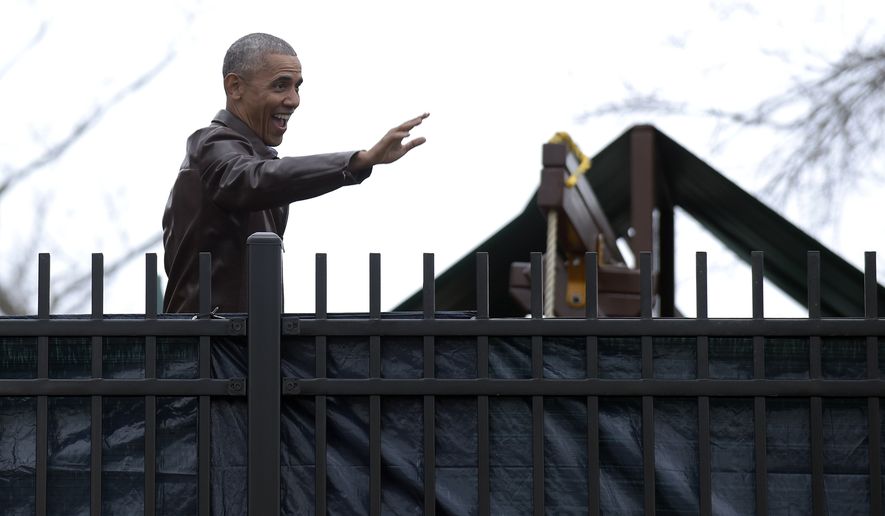The U.N.’s atomic agency said Monday that Iran has met a deadline for removing uranium-enriching centrifuges, as President Obama warned Americans — including President-elect Donald Trump — that unraveling the nuclear agreement would have “much worse” consequences.
The transfer of centrifuges and other equipment from Iran’s Fordow facility, a site buried deep inside a mountain, to storage at another underground enrichment site at Natanz was completed within a deadline of one year from the day the deal was put in place, Jan. 16 of last year, the International Atomic Energy Agency said.
“Iran has removed excess centrifuges and infrastructure from the Fordow Fuel Enrichment Plant in line with its nuclear-related commitments,” the IAEA said in a statement.
Mr. Obama, marking the one-year anniversary of the nuclear deal Monday, cited the report as proof that the incoming administration should keep the deal in place.
“Iran reduced its uranium stockpile by 98 percent and removed two-thirds of its centrifuges,” he said. “Meanwhile, Iran has not enriched any uranium at the Fordow facility nor used advanced centrifuges to enrich. In short, Iran is upholding its commitments, demonstrating the success of diplomacy.”
Mr. Trump has said he wants to renegotiate the deal, which lifted international sanctions against Tehran in exchange for limiting Iran’s nuclear program. Critics say the Obama administration’s deal won’t stop Iran from developing nuclear weapons.
Mr. Obama is leaving office at noon on Friday, when Mr. Trump will take the oath of office.
While Iran continues to sponsor terrorism, threaten Israel and imprison Americans unjustly, Mr. Obama said, “the challenges we face with Iran would be much worse if Iran were also on the threshold of building a nuclear weapon.”
“The Iran deal must be measured against the alternatives,” Mr. Obama said in a statement. “A diplomatic resolution that prevents Iran from obtaining a nuclear weapon is far preferable to an unconstrained Iranian nuclear program or another war in the Middle East.”
He added, “The United States must remember that this agreement was the result of years of work, and represents an agreement between the world’s major powers — not simply the United States and Iran.” Russia, China, Germany, France, Great Britain and the European Union also are parties to the agreement.
Secretary of State John F. Kerry said the deal “resolved a major nuclear threat without firing a shot or sending a single soldier into combat.”
“We still have serious differences with the government of Iran, and will continue to push back on its support for terrorism, disregard for human rights and destabilizing regional activities,” he said. “But the United States, our partners and allies in the Middle East and the entire international community are safer today” because of the agreement.
Energy Secretary Ernest Moniz said the agreement is providing “confidence that Iran is not developing a nuclear weapon and [maintaining] at least a one-year breakout time” to develop such a weapon.
The deal reached between six powers and Iran in 2015 stated that no more enrichment would take place at the Fordow site near the holy city of Qom for 15 years, but that Iran could keep just over 1,000 centrifuges there for other uses.
With Mr. Trump’s inauguration coming on Friday, officials who follow Iran closely have said they are waiting to see what stance the Republican takes on the deal, which also lifted international sanctions against the Islamic republic.
Mr. Trump has called the agreement, one of the Obama administration’s flagship achievements, “the worst deal ever negotiated.” He has, however, backed away from the assertion that he wants to “rip up” the deal, saying more recently that he would “police that contract so tough they (the Iranians) don’t have a chance.”
That raises the question of how he would react if Iran continued to test the deal’s boundaries. Twice since the pact was implemented in January, Tehran has gone over a 130-ton limit on its stock of heavy water, prompting limited criticism from the U.S.
Iran has also argued that the U.S. has failed to provide the full sanctions relief called for by the deal, a charge Washington denies. Tehran has, however, stopped short of triggering a dispute-resolution mechanism created by the deal.
• This article is based in part on wire service reports.
• Dave Boyer can be reached at dboyer@washingtontimes.com.




Please read our comment policy before commenting.